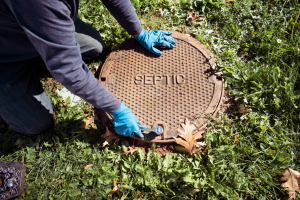The Do’s and Don’ts of Septic System Care: A Comprehensive Guide
Introduction
 Septic systems are essential for homes that are not connected to municipal sewage lines. Proper care and maintenance of your septic system are crucial to ensure its longevity and efficiency. Ignoring the do’s and don’ts of septic system care can lead to costly repairs and environmental hazards. In this blog post, we’ll explore the essential do’s and don’ts to help you maintain a healthy septic system.
Septic systems are essential for homes that are not connected to municipal sewage lines. Proper care and maintenance of your septic system are crucial to ensure its longevity and efficiency. Ignoring the do’s and don’ts of septic system care can lead to costly repairs and environmental hazards. In this blog post, we’ll explore the essential do’s and don’ts to help you maintain a healthy septic system.
The Do’s
1. Regular Pumping: Schedule regular septic tank pumping every 3 to 5 years, depending on your household size and usage. This prevents solid buildup, allowing the system to function efficiently.
2. Water Conservation: Use water-saving appliances and fixtures, fix leaks promptly, and spread out laundry and dishwasher use to avoid overwhelming the system with excess water.
3. Proper Waste Disposal: Only flush human waste and toilet paper down the toilet. Avoid flushing items like sanitary products, diapers, wipes, and cooking oils, as they can clog the system.
4. Septic-Friendly Products: Use septic-safe cleaning products and detergents to maintain a balanced bacterial environment in the tank.
5. Maintain Drainfields: Avoid parking or building structures on top of your drainfield. Plant grass or shallow-rooted plants to prevent soil erosion and promote natural filtration.
6. Regular Inspections: Have a professional inspect your septic system annually to catch any issues before they escalate.
7. Protect Your Tank: Avoid driving heavy vehicles over the septic tank or drainfield, as this can cause damage. Additionally, keep trees with aggressive root systems away from the tank and drainage field.
8. Educate Your Household: Make sure everyone in your home knows what can and cannot be flushed or poured down the drains.
The Don’ts
1. Avoid Excessive Water Usage: Do not overload the system with large amounts of water in a short period, such as taking long showers or doing multiple loads of laundry in a day.
2. No Chemical Drain Cleaners: Avoid using chemical drain cleaners, as they can harm the beneficial bacteria in your septic tank.
3. Grease and Oil Disposal: Never pour cooking oils or grease down the drain, as they can solidify and clog pipes and the septic system.
4. Avoid Harsh Cleaning Chemicals: Chemicals like bleach and strong disinfectants can disrupt the balance of bacteria in your septic tank. Use eco-friendly alternatives.
5. Say No to Garbage Disposals: Garbage disposals can overload the septic system with organic matter. Consider composting kitchen waste instead.
6. No DIY Repairs: Avoid attempting to repair the septic system yourself. DIY efforts can often make the problem worse. Always call a professional if you suspect an issue.
7. Don’t Plant Deep-Rooted Trees: Trees like willows and maples have aggressive root systems that can damage septic tanks and drainfields. Plant them far away from your system.
Conclusion
Proper care of your septic system is essential for the health of your home, your wallet, and the environment. By following these do’s and don’ts, you can ensure that your septic system operates efficiently for years to come. Remember, regular maintenance, mindful water usage, and responsible waste disposal are the keys to a trouble-free septic system.


 Facebook
Facebook
 X
X
 Pinterest
Pinterest
 Copy Link
Copy Link

